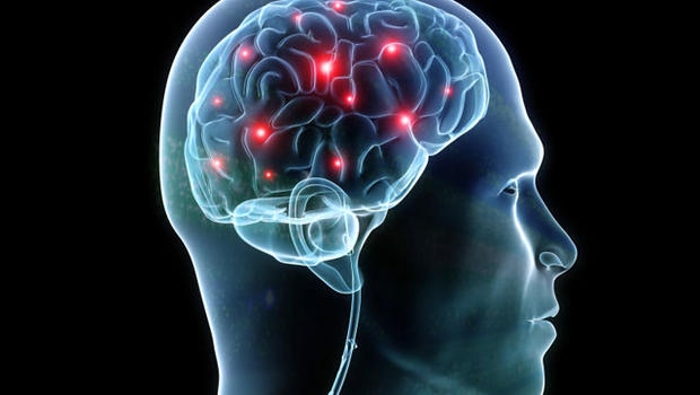Your Brain on Reward
Psychologist and IPR associate Robin Nusslock pursues the science of incentive
Get all our news

Studying the brain's reward systems can aid in understanding decision making, according to psychologist and IPR associate Robin Nusslock.
Why would someone choose to gamble away $700,000 of his or her life savings at a Vegas poker table rather than save it for retirement? For psychologist and IPR associate Robin Nusslock, this choice is an example of a larger and more fundamental question, “To what extent do basic reward systems in the brain inform the decisions—both healthy and unhealthy—that we make in our life?”
At an April 14 IPR colloquium, Nusslock unpacked research into the “science of incentive,” or how the brain pursues and processes rewards. Along with his team at Northwestern’s Affective & Clinical Neuroscience Lab, which he directs, Nusslock studies the neural “mechanics” behind how the brain chooses X over Y—and ultimately, how it might inform understanding a variety of brain disorders, from addiction and depression to bipolar disorder and Parkinson’s.
“If we understand the mechanics of how the brain operates in this domain, we can understand some of the bigger decisions that we make,” said Nusslock, who is also studying brain and health-related disorders with IPR health psychologist Greg Miller.
Nusslock describes how the neurotransmitter dopamine is the key chemical associated with what he calls the “motor of the mind,” or the mesolimbic dopamine reward system. This midbrain system helps us process reward cues and weigh the likelihood of receiving a reward, as well as what motivates us to get “off the couch” and pursue our goals and rewards.
To study the connection between reward signaling and decision-making behavior, Nusslock and his team created an experiment where they used a functional magnetic resonance imaging (fMRI) scanner to measure blood flow to certain brain cells during a goal-oriented task. After being asked to visualize a goal to pursue, study participants then engaged in a button-pushing task for a chance to win a cash reward. The researchers found that the prompt of goal-oriented thinking did activate participants’ dopamine circuits and altered their decision making in real time.
Nusslock offers that this and other dopamine-related research both confirms and challenges “rational choice perspective” economics, which argues that people make consistently logical decisions to pursue their best option, maximizing utility.
While dopamine moderates a person’s pursuit of a reward (wanting), another system, ruled by opioids, modulates a person’s enjoyment (pleasure) of a reward. Dopamine is also highly variable, either increasing or decreasing as the brain sizes up its chance of getting a particular reward. Once it turns off, Nusslock explains, the brain becomes “bored,” seeking novel, and potentially irrational or harmful, experiences to compensate.
“When you’re pursuing a reward, it’s a very different affective, biological, psychological state than the act of consuming reward,” Nusslock said.
Such moments of “dissociation” between the pursuit and enjoyment of rewards highlights why people might “lust” for something that gives them no pleasure at all while “loathing” the so-called reward.
“The rational-choice perspective says that we consistently make the same decisions,” Nusslock continued, “but what I’m suggesting is that may not be how the brain operates.”
Addiction is one example of how this rational choice perspective “falls short,” according to Nusslock. He is currently conducting a study, supported by the National Institutes of Health, to determine if lower levels of reward-related brain functioning can predict drug use.
“Low reward signaling is actually keying people up to make bad decisions because they are seeking outside themselves what they lack within,” he said.
Depression, one of the world’s leading causes of disability according to the World Health Organization, is another example of such “disrupted reward signaling.” Depressed people display decreased reward signaling and have a harder time identifying and pursuing rewards and goals. His lab is showing how depressed people engage their brain’s cortex in a way that “hijacks” their reward systems.
Nusslock and his lab are now working to develop a “stress test for the brain” that would help to identify these disorders, which affect millions of people, by recognizing disrupted reward systems early on.
“If you can actually use the reward system to find signals of differential risk, you may be able to use these systems to facilitate a more accurate and timely diagnosis,” he said.
Robin Nusslock is an associate professor of psychology and an IPR associate.
Photo credit: Wikimedia Commons
Published: June 23, 2017.